SPHIS Home » Departments » Commonwealth Institute of Kentucky (CIK) » Policy Briefs
Policy Briefs
Trends in Maternal and Congenital Syphilis in Kentucky (2018-2022)
August 2024
Rates of maternal and congenital syphilis are on the rise in Kentucky and are especially high among Black women and those with Medicaid coverage. Congenital syphilis can be prevented if screening and treatment occur early enough in pregnancy. Urgent attention needs to be given to ensuring access to preventive care prior to pregnancy and facilitating early access to prenatal care to screen for and treat syphilis in a timely manner.
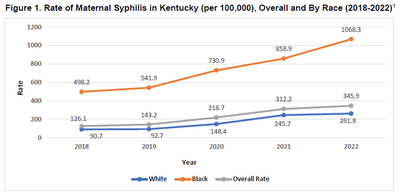
MORE INFORMATION
Association Between Dental Prophylaxis and Pneumonia in Kentucky Medicaid Beneficiaries
June 2023
Pneumonia is a lung infection that may result in life-threatening complications. There is evidence that people with uncontrolled type 2 diabetes mellitus may be at higher risk of death due to pneumonia and that, generally, those with diabetes have worse infection outcomes than those without diabetes. Kentucky is ranked 7th nationally for influenza and pneumonia-related mortality. In 2021, Kentucky had the 5th highest prevalence of type 2 diabetes in the U.S. at 13.8%.
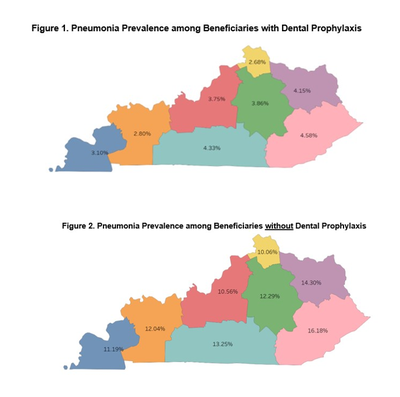
MORE INFORMATION
Improving the Health of Kentuckians: The Value of an All-Payer Claims Database
May 2023
A growing movement towards more transparency in healthcare price and quality has brought the discussion of All-Payer Claims Databases (APCDs) to the forefront. The Hospital Price Transparency Rule, issued by the Centers for Medicare and Medicaid Services (CMS), became effective on January 1, 2021. It requires hospitals to publicly post negotiated prices paid to physicians and healthcare facilities for at least 300 shoppable services in a consumer-friendly manner. This rule was an attempt towards price transparency for healthcare services, theoretically enabling patients to shop online for prices and make informed decisions about where to receive healthcare. The rule also aims to reduce overall healthcare costs by allowing for benchmarking of hospital pricing. Recent research, however, found that hospitals have been slow to comply with the rule. In 2022, CMS reported that more than 30% of hospitals were not fully compliant.
Key Takeaways
- All Payer Claims Databases (APCD) serve as a tool to monitor and assess patterns in healthcare access, quality, efficiency, costs, and affordability.
- While APCD-related legislation in Kentucky has not been passed, proposed bills have facilitated increased momentum toward establishing an APCD in Kentucky. Organizations such as the Foundation for a Healthy Kentucky, Kentucky Voices for Health, Kentuckiana Health Collaborative, University of Louisville School of Public Health and Information Sciences, and others have collaborated to educate and advocate for an APCD in Kentucky.
MORE INFORMATION
Early Learnings from Louisville Metro’s Crisis Call Diversion Program
March 2023
Nationally, 10% of all law enforcement responses are related to a behavioral health crisis. Police officers across the country and in Louisville are not equipped, given their training and expertise, to effectively handle behavioral health crises. One strategy to address the growing need for behavioral health and build a more effective safety net for those with behavioral health conditions is the implementation of alternative responder models, such as Louisville Metro’s Crisis Call Diversion Program (CCDP). This research brief describes the CCDP and early findings from the University of Louisville’s evaluation of the pilot phase of the program.

Key Takeaways
- The pilot was effective in deflecting behavioral health-related calls from law enforcement, saving a total of 100 hours of Louisville Metro Police Department officer time between March 21 and May 8, 2022.
- There are opportunities for increasing awareness of the CCDP and its current and potential benefits to a variety of stakeholders to increase the reach and impact of the program.
MORE INFORMATION
Use of Medication to Treat Attention Deficit Disorders in Kentucky Preschoolers
February 2023
Attention deficit hyperactivity disorder (ADHD) is one of the most frequently diagnosed neurodevelopmental disorders among children in the United States. Based on parental self-report, Kentucky ranks second highest in the country for prevalence of ADHD among children ages 3-17 years old (13.2%).
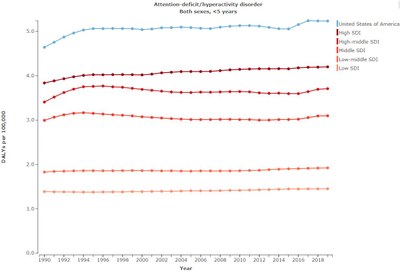
Key Takeaways
- There are reasons to be concerned about the treatment of ADHD in preschoolers, including a lack of evidence regarding the long-term effects of psychotropic medication use on the brain in the early stages of development.
- Given the extent of ADHD in Kentucky preschool-aged children, and the potential long-term consequences of misdiagnoses and the use of psychotropic medication, increased focus on policy and practice solutions should be considered.
MORE INFORMATION
Policy Options to Improve Outpatient Antibiotic Prescribing in the Pediatric Medicaid Population in Kentucky
January 2023
Antibiotic resistance is a growing threat to public health, particularly in the pediatric outpatient population, where antibiotic prescription rates are high. Kentucky has one of the highest pediatric antibiotic prescription rates in the United States, and rates are disproportionately high among children covered by Kentucky Medicaid. This policy brief describes several policy options that could be considered in Kentucky to improve antibiotic stewardship in outpatient settings.
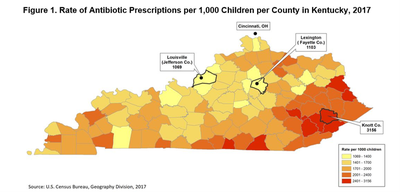
Key Takeaways
- The rate of pediatric outpatient antibiotic prescribing in Kentucky is high at 1,281 antibiotic prescriptions per 1,000 children, compared to the national rate of 760 antibiotic prescriptions.
- In 2016, Kentucky Medicaid spent over $17.6 million on antibiotic prescriptions for children.
- Kentucky, which has one of the highest rates of antibiotic prescribing in the country, has the opportunity to lead the nation in legislative efforts to improve antibiotic stewardship.
MORE INFORMATION
The Impact of Medicaid Managed Care on Non-Office-Based Service Utilization Among Kentucky Medicaid Beneficiaries with Chronic Disease
November 2022
Chronic disease is a high-cost domain for insurers, particularly Medicaid, because Medicaid beneficiaries usually have poorer health status in general. In 2019, the Kentucky Medicaid program spent significantly more than the national average per adult enrollee at $6,081 versus $3,840. This research brief focuses on findings related to non-office-based health services and reports results for services that their utilization changed after the implementation of MMC in not-Region 3, namely, non-hospital outpatient care, emergency transportation, and laboratory services.
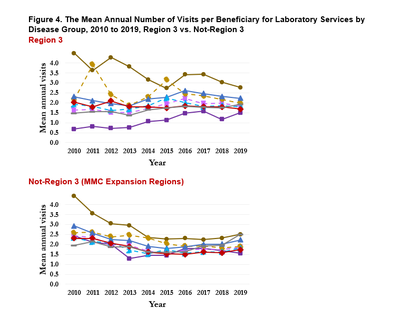
Key Takeaways
- Persistent increases occurred in non-hospital outpatient care most significantly in MMC expansion regions.
- There were marked decreases in the use of emergency transportation in MMC expansion regions, compared to Region 3.
- The use of laboratory services markedly decreased in MMC expansion regions, compared to Region 3, particularly among those with uncomplicated diabetes with a CVD comorbidity.
MORE INFORMATION
Medicaid Managed Care and the Utilization of Office-Based Services Among Kentucky Medicaid Beneficiaries with Chronic Disease
October 2022
The burden of chronic disease is high in Kentucky, particularly for mortality related to cancer, diabetes, and cardiovascular disease (CVD). Chronic disease is a high-cost domain for insurers, particularly Medicaid, because Medicaid beneficiaries usually have poorer health status in general. Given the remarkably high burden of cancer, CVD, and diabetes on Kentuckians’ health and the extent of Medicaid coverage in Kentucky, it is important to assess the impact of these conditions on the utilization of care and, ultimately, the impact of Medicaid reforms on beneficiaries with chronic disease. This research brief focuses on findings related to office-based care utilization among Medicaid beneficiaries in expansion regions, specifically office-based primary and preventive care, physician, physician assistant, and nursing visits.
Key Takeaways
- The use of primary and preventive care decreased in regions that switched to MMC compared to Region 3.
- There were sharp declines in office-based physician visits among Medicaid beneficiaries in MMC expansion regions compared to Region 3.
- MMC expansion led to an increase in office-based physician visits among Medicaid beneficiaries.
- MMC expansion led to an increase in office-based nurse visits among Medicaid beneficiaries.
MORE INFORMATION
Depressive and Anxiety Disorders Among Medicaid Beneficiaries in Kentucky
October 2022
Anxiety and depression are among the most common behavioral health disorders worldwide and have been associated with higher health care costs, increased risk for diseases such as cardiovascular illnesses, and an overall reduction in quality of life. The COVID-19 pandemic exacerbated already high rates of depression and anxiety. Among adults in Kentucky, self-reported frequent mental distress, characterized by 14 or more days of poor mental health in the past month, increased 26% from 13.8% to 17.4% between 2015 and 2020. This research brief summarizes the findings of a study of the prevalence and treatment utilization for depressive and anxiety disorder (DAD) among Medicaid beneficiaries in Kentucky from 2012-2019.
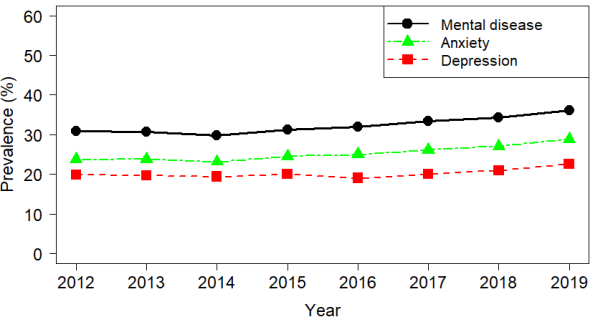
Key Takeaways
- Since 2012, the prevalence of DAD among Kentucky Medicaid beneficiaries has increased significantly from 31% in 2012 to 36% in 2019.
- Louisville had the lowest DAD rates, while counties in southeastern Kentucky had the highest rates.
- The use of medication-based treatment for depressive and anxiety disorder in Kentucky Medicaid beneficiaries increased as age increased, with the highest usage in ages 35-54.
MORE INFORMATION
Alcohol Use Disorder and Treatment Utilization among Medicaid Beneficiaries in Kentucky
September 14, 2022
Alcohol use disorder (AUD) includes the conditions of alcohol addiction, abuse, and dependence and is the leading substance use disorder among people ages 14 and older in the United States. In Kentucky, 8.7% of adults over the age of 18, and 2.2% of youth between the ages of 12-17 reported struggling with alcohol dependence or abuse in 2019-2020. While the rate of alcohol dependence in Kentucky is lower than the national average, (11.0% for adults ages 18 and up, 2.9% for youth ages 12-17), the rate of alcohol-induced deaths in the state has sharply increased over time from 6.6 per 100,000 in 2013 to 14.6 in 2020. The purpose of this study was to identify risk factors associated with AUD and assess AUD prevalence and treatment use among Kentucky Medicaid beneficiaries. The research also identifies potential policy and practice strategies to address AUD.
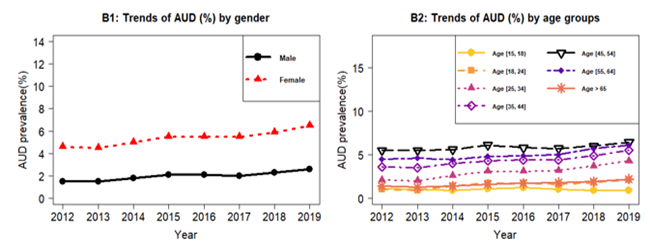
Key Takeaways
- As individuals age, the likelihood of progressing from AUD to organ disease increases.
- Females were less likely than males to progress from AUD to organ disease.
- Individuals with congestive heart failure were more likely to progress to organ disease, while those with dementia, rheumatoid disease, and opioid use disorder were less likely.
- Individuals who received counseling were much less likely to be hospitalized or use the emergency department.
MORE INFORMATION
Policy Considerations to Address Chronic Disease in Kentucky
August 2022
Kentucky consistently ranks low among other states for lifestyle behaviors, including nutrition, physical activity and exercise, and fruit and vegetable consumption. In 2021, Kentucky was ranked as the least healthy state across all four measures. Kentucky also recently ranked in the bottom eight states for preventable chronic diseases such as cardiovascular disease, chronic kidney disease, and diabetes. This brief describes selected policy interventions designed to address chronic disease, including the outcomes of the interventions and their potential impact on the lives of Kentuckians.

Key Takeaways
Key policy and practice interventions have been implemented in Kentucky with various levels of evidence of effectiveness.
There are additional opportunities for targeted outreach to ensure individuals are aware of and have access to healthy food options and other healthy lifestyle changes.
MORE INFORMATION
Kentucky Extends Medicaid to One-Year Postpartum
June 2022
While pregnancy-related Medicaid is traditionally limited to 60 days postpartum, many states are moving towards extending coverage for up to one year postpartum. This extension is facilitated by the passage of the federal American Rescue Plan Act of 2021 that made it possible for states to use federal matching funds to extend Medicaid coverage from 60 days to 12 months postpartum through a state plan amendment. On April 20, 2022, Governor Andy Beshear signed SB178, which extends Kentucky’s Medicaid coverage for pregnant women from 60 days to 12 months postpartum.

Key Takeaways
Because Medicaid funds a large portion of births in Kentucky, changes in structure and benefit design can have a significant impact on the health and well-being of women in the postpartum period.
- A national study estimated that approximately 10,000 additional Kentucky women would receive 12-month postpartum Medicaid coverage with the extension.
MORE INFORMATION
Louisville Metro Crisis Call Diversion Program Pilot Final Evaluation Report
June 2022
The Commonwealth Institute of Kentucky completed a process and outcome evaluation of the Louisville Metro Crisis Call Diversion Program (CCDP), which included analyzing multiple data sets over CCPD’s first 49 days, as well as 70 interviews with administrators and responder groups, and focus groups with 96 community members. In this report, Dr. Brian Schaefer and colleagues, provide a detailed description of implementation processes, community and stakeholder perceptions of the pilot and its contribution to public safety, and economic outcomes of the CCDP pilot in Louisville Metro’s Fourth Division. They also provide recommendations to expand and strengthen the model in Louisville to better serve those in need and reduce the burden on law enforcement. It is important to keep in mind that this evaluation is an assessment of a short (7 week) and small pilot project. CCDP volume is increasing as familiarity and experience sets in, the long-term success of the intervention will be its evolutions.
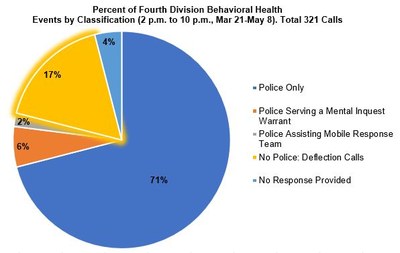
MORE INFORMATION
Maternal Mortality in Kentucky
February 2022
The United States (U.S.) has the highest rate of maternal mortality in the developed world, despite spending significantly more on healthcare than other developed countries. In 2018, Kentucky’s maternal mortality rate was 40.8 per 100,000 live births, significantly higher than the national rate. This brief explores data specific to maternal mortality in Kentucky, describes efforts to address high rates, and provides recommendations to guide future research.
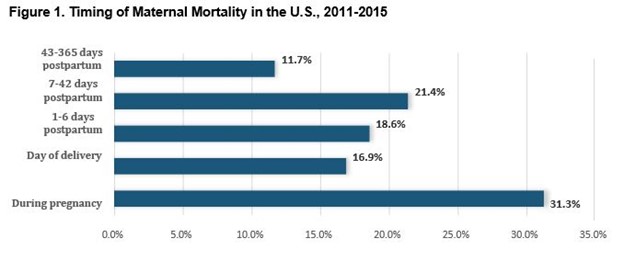
Key Takeaways
- Structural and systemic factors are key drivers of maternal mortality, including racism, lack of access to care, and socioeconomic status.
- Kentucky has made significant progress in understanding and addressing maternal mortality through the Kentucky Perinatal Quality Collaborative, Maternal Mortality Review Committee, and other policy and practice actions.
- Expanded research focus on maternal mortality can support evidence-based efforts to reduce maternal morbidity and mortality in the Commonwealth.
MORE INFORMATION





